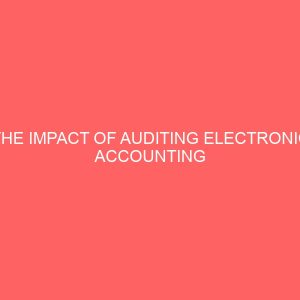Description
THE IMPACT OF AUDITING ELECTRONIC ACCOUNTING SYSTEM ON CORPORATE PERFORMANCE
ABSTRACT
The primary aim of this research work is to appraise the impact of auditing accounting electronic accounting system on corporate performance. Audits are performed to ascertain the validity and reliability of information, also to provide an assessment of a system’s internal control. The goal of an audit is to express an opinion of the person/organization/system etc, in question under evaluation based on work done on a test basis. Does electronic audit assess how successfully processes have been implemented, for judging the effectiveness of achieving any defined target level? Does electronics audit provide evidence concerning reduction and elimination of problem areas? Does electronic audit contribute to the corporate performance of organizations? To what extent does electronic audit impact on the growth and profitability of organizations? Does electronic audit impact positively on the diverse accounting activities that go on in an organization? For a successful completion of this research work, the researcher made use of both primary and secondary method of data collection for information gathering. The data collected were presented in table and analyzed with simple percentage while the hypothesis stated were analyzed with Chi-Square. Summary of findings, recommendations and conclusion were drawn as regards to this research work.
CHAPTER ONE
Introduction
1.1 Background of the study
Audit could be defined as an independent examination of the accounting books, records and financial statement of an organization by an appointed auditor to enable him express an independent opinion as to whether the financial statement are in agreement in all materials respects with the applicable financial reporting frame work and consequently shows a true and fair view. (Inyiama, 2010:5).
An audit is an evaluation of a person, organization, system, process, enterprise, project or product (Onyike, 2003:34). The term most commonly refers to audit in accounting, but similar concepts also exist in project management, quality management and energy conservation.
Audit are performed to ascertain the validity and reliability of information, also to provide an assessment of a system’s internal control. The goal of an audit is to express an opinion on the person /organization system etc in question, under evaluation base on work done on a test basis.
Due to practical constraints, an audit seeks to provide only reasonable assurance that the statement are free from material error. Hence, statistical sampling is often adopted in audits. In the case of financial audits, a set of finance statements are said to be true and fair when they are free of material misstatements a concept influence by both quantitative (numerical) and qualitative factors. But recently, argument that auditing should go beyond just true and fair is gaining information about financial systems and the financial records of a company or a business. However, recent auditing has begun to include non-financial system area ,such as safety ,mental concerns non-profit organization and government agencies, there has been an increasing need for performance audits, examining their success in satisfying mission objectives. As a result, there are now audit professionals who specialize in security audits, information systems audits and environmental audits.
Today’s increased use of computer and the correspond trend to eliminate excess paper work by storing files electronically has brought both benefits and challenges to the audit process rather than relying exclusively on dwindling paper trial, many firms and internal, auditors are incorporating electronic auditing techniques into their standard audit procedures for an enhanced corporate performance.
One option for auditing electronic files is to use standard data base programs such as As Assess. By importing information into the software or by linking to electronic transaction files, an auditor can efficiently analyze vast amount of data. Many common test procedures such as aging, counting and totaling of transaction can be automated with these programs. In addition, the software allows the user to perform analytical procedures quickly and easily, such as sorting, stratifying or making comparisms with in the data set.
Electronic auditing, or e-auditing is therefore a computer assisted auditing that uses electronic records to complete all or part of the audit.
1.2 Statement of the Problem
Quality audits are essential to verify the existence of objective evidence showing conformance to required processes to assess how successfully processes have been implemented, for judging the effectiveness evidence concerning reduction and elimination of problem areas and are a hards-on management tool for achieving continual improvement in an organization to benefit the organization, quality auditing should not only report non-conformance and corrective actions but also high light areas of good practice and provide evidence of conformance. In this way, other department may share information and amend their working practices as a result also enhancing continual improvement. Most firms have been lacking in this aspect of quality electronic auditing there by adversely affecting corporate performance.
1.3 Objectives of the Study
The main objective of this research work is to appraise the impact of auditing electronic accounting system on corporate performance. Other objectives include the following:
1. To examine if electronic audit assess how successfully processes have been implemented; for judging the effectiveness of achieving any defined target levels.
2. To find out if electronic audit provide evidence concerning reduction and elimination of problem areas.
3. To find out if electronic audit contribute to corporate performance of organization.
4. To examine if electronic audit impact on the growth and profitability of organizations.
5. To examine the impact of electronic audits on the diverse accounting activities that goes on in an organization.
1.4 Research Questions
The following research questions are formulated for the purpose of this research work.
1. Does electronic audit assess how successfully processes have been implemented; for judging the effectiveness of achieving any defined target levels?
2. Does electronic audit provide evidence concerning reduction and elimination of problem areas?
3. Does electronic audit contribute to corporate performance of organization?
4. To what extent does electronic audit impact on the growth and profitability of organizations?.
5. Does electronic audits impact on the diverse accounting activities that goes on in an organization?.
1.5 Research Hypotheses
Hypothesis one
Ho: Electronic audit does not assess how successfully processes have been implemented; for judging the effectiveness of achieving any defined target levels.
H1: Electronic audit not assess how successfully processes have been implemented; for judging the effectiveness of achieving any defined target levels.
Hypothesis two
Ho: Electronic audit does not provide evidence concerning reduction and elimination of problem areas?
H1: Electronic audit provide evidence concerning reduction and elimination of problem areas.
Hypothesis three
Ho: Electronic audit does not contribute to corporate performance of organization.
H1: Electronic audit contribute to corporate performance of organization.
Hypothesis four
Ho: Electronic audit does not impact on the growth and profitability of organizations.
H1: Electronic audit impact on the growth and profitability of organizations.
Hypothesis five
Ho: Electronic audits does not impact positively on the diverse accounting activities that go on in an organization.
H1: Electronic audits impact positively on the diverse accounting activities that go on in an organization.
1.6 Significance of the Study
This research work will be of immense significance to diverse organization, especially accounting organizations. It will go to a target extent in enlightening them on the concept of electronic auditing and its impact in enhancing performance.
It will also benefit students and researchers they will widen their scope from the information contained in this research work.
1.7 Scope and Limitation of the Study
The research work is focused on the impact of auditing electronic accounting system on corporate performance in organizations.
The researcher have limitation in understanding some computer software used by auditors.
Difficulty in sourcing information from the organization of study (consolidated investment limited). Financial constants in sourcing for primary data.
1.8 Definition of Terms
¨ Audit: This is an evaluation of a person, organization, system, process, enterprise, project or product.
¨ Electronic auditing: This is a computer assisted auditing that uses electronic records to complete all or part of the audit.








Reviews
There are no reviews yet.